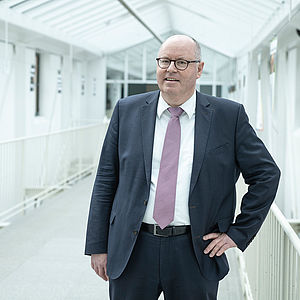"A more integrated Europe – also in criminal law – can only emerge on the basis of a consensus-driven community of values. However, the constitution of a European space of freedom, security and law is proving difficult because major discrepancies persist between the criminal law systems of the European nation-states which feed through into the specific configuration and conduct of criminal proceedings.
As early as in 1998, as a young career researcher, my doctoral thesis at Trier University revolved around the question of whether minimum standards of criminal law are emerging on the basis of the European Human Rights Convention (EHRC) and the International Covenant on Civil and Political Rights (ICCPR) by which both national criminal law systems and European institutions of criminal prosecution (including the European Public Prosecutor's Office, EPPO) must abide. This includes crime prevention and the investigation of crimes, but also the rights of defendants in criminal proceedings and protective action as well as participatory rights for putative victims of criminal activity.
To address these questions of criminal law that potentially impact us all, I set up "Human Rights in Criminal Proceedings (HCRP)" at the University of Passau in 2010 as a research and advanced training centre and expert helpdesk for all issues relating to the international protection of human rights in criminal proceedings.
Ever since – in addition to EU criminal law and international criminal law – I have been busy systematising the adjudication of the European Court of Human Rights (ECHR) in Strasbourg and the decision-making practice of the UN human rights committees (including HRC, CAT) in the criminal law context. The functions of HRCP include devising interdisciplinary guest lectures, expert conferences, excursions, workshops, seminars and continuing education events on human rights protection for judges, state prosecutors, lawyers, criminal defence lawyers and students."
More about Professor Robert Esser's research
A selection of projects:
- European and international human rights protection:
Analysis and systematisation of the adjudication of the European Court of Human Rights (ECHR) and the decision-making practice of the UN Human Rights Committee (HRC) as well as the UN Committee against Torture (CAT) (since 2007) - Security laws, freedom commission and surveillance calculus:
Cooperation/research group involving LMU in Munich and the German Bar Association (Deutscher Anwaltverein e.V. – DAV) (2021-2023); Preliminary results: Eckpunktepapier für die Errichtung einer Freiheitskommission, KriPoZ 2022, 326-338 - European Public Prosecutor's Office (EPPO)
The transnationality of criminal prosecution as a challenge for criminal defence law (since 2021); Preliminary results: Herrnfeld/Esser (eds.), Europäische Staatsanwaltschaft, Handbuch, Nomos-Verlag, 2022, ISBN 978-3-8487-5681-0 - Transnational recognition of government decisions – Cross-disciplinary principles of international procedural law:
Research Network, 2021-2025; DFG application - Criminalization of Torture and Enforced Disappearance in a Federal Nepal:
(2019-2023): Multi-stakeholder cooperation bringing together the International Commission of Jurists (ICJ), Advocacy Forum (AF), Terai Human Rights Defenders Alliance (THRD Alliance) and the University of Passau; endowed with funds from the Federal Foreign Office (2019-2021); Results: Esser/Sümnick (eds.), "Human Rights Protection and Policing in Nepal: A manual for Nepal Police", Kovac-Verlag (2021), ISBN 978-3-339-12502-6; final publication Nomos-Verlag (July 2023): Esser/Sümnick (eds.), "Menschenrechtsschutz in der Polizeiarbeit: Rechtliche und praktische Umsetzung internationaler Standards in Nepal" (study with recommendations) - German-Taiwanese Criminal Law Forum:
Research cooperation on current issues of criminal and criminal procedure law / biennial conference: University of Passau, LMU in Munich, Osnabrück University, National Taiwan University (NTU), National Cheng Kung University (NCKU), National University Kaohsiung, National Taichung University, Academy for the Judiciary Taiwan (Taipei); Results (most recent): Sinn/Zöller/Esser (eds.), Reform der Vermögensabschöpfung, Kovac Verlag, 2019, ISBN 978-3-339-11220-0; 8. Forum on the overarching topic "Criminal Law of the Future" in July 2023 - Modern media in risk prevention law and criminal procedure law:
Working Group on Criminal Procedure Law and Police Law (Arbeitskreis Strafprozessrecht und Polizeirecht, ASP); cooperation with Trier University (2017-2019), Results: Zöller/Esser (ed.), Justizielle Medienarbeit im Strafverfahren: Entwurf des Arbeitskreises Strafprozessrecht und Polizeirecht (ASP) für eine die Pressefreiheit und das Persönlichkeitsrecht (publication on project conclusion), Nomos Verlag, 2019, ISBN 978-3-8487-5643-8 - Reform of the code of criminal law and code of criminal procedure in Vietnam:
Experts research for Friedrich-Ebert-Stiftung (FES) and the German Foundation for International Legal Cooperation (IRZ); seminars for judicial practitioners and lawyers; summer academies for students) (since 2011)


